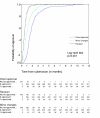The activity of French research ethics committees and characteristics of biomedical research protocols involving humans: a retrospective cohort study
- PMID: 16229743
- PMCID: PMC1323331
- DOI: 10.1186/1472-6939-6-9
The activity of French research ethics committees and characteristics of biomedical research protocols involving humans: a retrospective cohort study
Abstract
Background: Clinical trials throughout the world must be evaluated by research ethics committees. No one has yet attempted to clearly quantify at the national level the activity of ethics committees and describe the characteristics of the protocols submitted. The objectives of this study were to describe 1) the workload and the activity of Research Ethics Committees in France, and 2) the characteristics of protocols approved on a nation-wide basis.
Methods: Retrospective cohort of 976 protocols approved by a representative sample of 25/48 of French Research Ethics Committees in 1994. Protocols characteristics (design, study size, investigator), number of revisions requested by the ethics committee before approval, time to approval and number of amendments after approval were collected for each protocol by trained research assistant using the committee's files and archives.
Results: Thirty-one percent of protocols were approved with no modifications requested in 16 days (95% CI: 14-17). The number of revisions requested by the committee, and amendments submitted by the investigator was on average respectively 39 (95% CI: 25-53) and 37 (95% CI: 27-46), per committee and per year. When revisions were requested, the main reasons were related to information to the patient (28%) and consent modalities (18%). Drugs were the object of research in 68% of the protocols examined. The majority of the research was national (80%) with a predominance of single-centre studies. Workload per protocol has been estimated at twelve and half hours on average for administrative support and at eleven and half hours for expertise.
Conclusion: The estimated workload justifies specific and independent administrative and financial support for Research Ethics Committees.
Figures


Similar articles
-
Performance of research ethics committees in Spain. A prospective study of 100 applications for clinical trial protocols on medicines.J Med Ethics. 1999 Jun;25(3):268-73. doi: 10.1136/jme.25.3.268. J Med Ethics. 1999. PMID: 10390685 Free PMC article.
-
Acceptability and profile of the clinical drug trials underway in Finnish university hospitals in the 1990s: applications reviewed by ethics committees.Methods Find Exp Clin Pharmacol. 2001 Sep;23(7):415-23. doi: 10.1358/mf.2001.23.7.662124. Methods Find Exp Clin Pharmacol. 2001. PMID: 11771857
-
Should local research ethics committees monitor research they have approved?J Med Ethics. 2000 Oct;26(5):330-3. doi: 10.1136/jme.26.5.330. J Med Ethics. 2000. PMID: 11055034 Free PMC article.
-
Research ethics committees in Japan: A perspective from thirty years of experience at Tokushima University.J Med Invest. 2015;62(3-4):114-8. doi: 10.2152/jmi.62.114. J Med Invest. 2015. PMID: 26399332 Review.
-
Sample size determinations in original research protocols for randomised clinical trials submitted to UK research ethics committees: review.BMJ. 2013 Mar 21;346:f1135. doi: 10.1136/bmj.f1135. BMJ. 2013. PMID: 23518273 Free PMC article. Review.
Cited by
-
An eight-year follow-up national study of medical school and general hospital ethics committees in Japan.BMC Med Ethics. 2007 Jun 29;8:8. doi: 10.1186/1472-6939-8-8. BMC Med Ethics. 2007. PMID: 17598923 Free PMC article.
-
Considerations of sex and gender dimensions by research ethics committees: a scoping review.Int Health. 2022 Nov 1;14(6):554-561. doi: 10.1093/inthealth/ihab093. Int Health. 2022. PMID: 35043198 Free PMC article.
-
SPIRIT 2013 explanation and elaboration: guidance for protocols of clinical trials.BMJ. 2013 Jan 8;346:e7586. doi: 10.1136/bmj.e7586. BMJ. 2013. PMID: 23303884 Free PMC article.
-
Survey on the current practice of research ethics committees in the Czech academic environment: a mixed-methods study.BMC Med Ethics. 2024 Dec 23;25(1):153. doi: 10.1186/s12910-024-01157-2. BMC Med Ethics. 2024. PMID: 39710660 Free PMC article.
-
Polish Research Ethics Committees in the European Union system of assessing medical experiments.Sci Eng Ethics. 2009 Jun;15(2):201-12. doi: 10.1007/s11948-009-9113-x. Epub 2009 Jan 21. Sci Eng Ethics. 2009. PMID: 19156538
References
-
- Loi 88-1138 du 20 Décembre 1988 dite Loi Huriet-Sérusclat. Loi relative à la protection des personnes qui se prêtent à des recherches biomédicales http://www.legifrance.gouv.fr/WAspad/UnDocument?base=LEGI&nod=SPEAJXXXXX...
Publication types
MeSH terms
LinkOut - more resources
Full Text Sources
Medical

